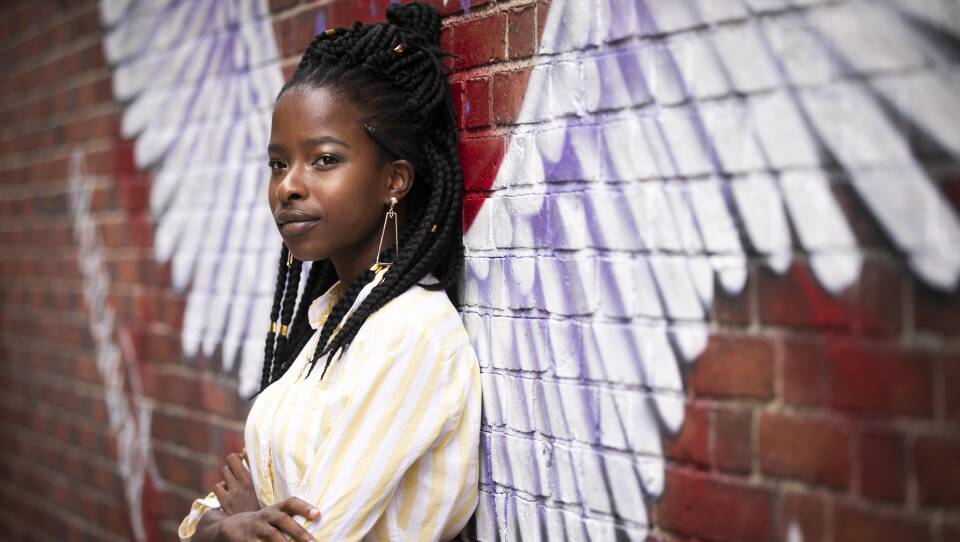As plans for the Wednesday inauguration of President-elect Joe Biden continue to take shape, we've learned that it will feature an inaugural poet who has ties to Massachusetts. Harvard graduate Amanda Gorman spoke with GBH executive arts editor Jared Bowen in May about becoming the nation's first youth poet laureate. Jared Bowen discussed Gorman and the tradition of inaugural poets with GBH All Things Considered host Arun Rath. This transcript has been edited for clarity.
Arun Rath: So tell us about this young poet.
Jared Bowen: Amanda Gorman is just an extraordinary human being. She is just such a bright light — examining, absorbing, looking at the world around us, taking it in and then turning it around and, as great poets and artists do, giving it back to us so that we can see ourselves. She was named the first youth poet laureate a few years ago, and she has made it her mission to spend time with kids to make them understand the power of words. Now, just a few weeks ago, she learned that she would deliver the poem for Biden's inauguration in just a few days.
Rath: We're going to talk about Gorman in more detail, but tell us first about this tradition of inaugural poets.
Bowen: Well actually, it's not a lengthy one. I was surprised to learn, as I did my own research, that there have been only five. It started with former President John F. Kennedy, who famously had Robert Frost. I say famously because Frost had a poem that he had written for the inauguration, but Washington had a huge snowfall just before the inauguration, and when Frost got on the podium, he was afraid that he wouldn't be able to read his poem because of that blinding light. He ended up doing another one, "The Gift Outright," from memory. And then former President Bill Clinton had an inaugural poet for both of his inaugurations, as did former President Barack Obama. Clinton, of course, had Maya Angelou, who read "On The Pulse Of Morning," which just took the nation by storm, I think.
Rath: We were talking earlier today about this, how that just came to my mind right away. I was thinking of Angelou and that moment, because there were people who were excited about poetry that weren't before, people buying books about poetry. But also how Angelou, at that moment where — it wasn't as divided as it is right now — but she delivered this poem that talked about things like slavery, and it was unifying and wonderful. The outgoing President George H. W. Bush was applauding as hard as everybody else at the end. I'm thinking about that now, because it gave us an idea of what an inaugural poem could be.
Bowen: Right. I think we're so used to political words, we're used to speeches, we're used to boilerplate, and then you have a poet who steps forward, an artist whose job is in words, but not only in words, but the economy of words and telling us pictures. You look back at that poem by Angelou, and she told us about our country in just a few short minutes. I watched it again today. It was only about five or six minutes long, but the imagery that we had and I think the collective appreciation we had for our people and our country in that poem came to the fore. I think that Gorman will very much be in the same vein.
Rath: Coming back to Gorman, what has she said about about trying to be creative in a time like this?
Bowen: Well, she has had to be creative. She was just finishing up, in May when I spoke with her, her time at Harvard University. She had been back in California. She couldn't graduate with a big ceremony here because of the pandemic. And she did feel this pressure to write, which she told me about. We spoke to her just as she had done this poem called "The Miracle Of Morning." She had been looking out her window, and she was just watching the world happen, and the world was happening. People were out, they were walking, there was sunshine. And so she wrote about that. But she did tell me there is struggle there. However, she channeled some very powerful figures to draw out her creativity.
"I was thinking about, you know, Martin Luther King writing from a Birmingham jail, a letter on racial injustice," Gorman said. "I was thinking about Nelson Mandela writing and reading while he was in jail for decades. I was thinking of Anne Frank writing while she was hiding from Nazis. All that is to say, I was thinking about, what do humans do when they are scared and alone and isolated from the rest of the world? And often it's truth telling and it's telling stories that matter."
Rath: Wow. That's making me think of other young poets as well, like Wilfred Owen, who was 25 or so when writing World War I poems in isolation, the kind of stuff that she's talking about. Gorman is 22?
Bowen: She's 22 years old. Words have always mattered to her. She is the daughter of an English teacher. She told me that she comes from a very strong oral tradition. She's very performative, too. I think when we see her on the podium, you'll see her hands moving, her hands gesturing and telling stories. This is why, I think, because of this this aura that she has about her and her strength, she's drawn the attention of Lin-Manuel Miranda, Oprah Winfrey, other political figures like Hillary Clinton. But all along, she's just made it her priority to spread the power of words.
Rath: You kind of got the inside track on what it means to deliver a poem at the inauguration. What does it take?
Bowen: This is interesting. I mentioned earlier on that Gorman just found out really within the last few weeks that she would be the inaugural poet. Apparently that's standard. Recently, when I was on Boston Public Radio hosting with Margery Eagan, we had the poet Richard Blanco on. He delivered his inaugural poem "One Today" in 2013 for the Obama inauguration, and he told me that, yeah, they just call you, you have just a little bit of time to put this all together. He also talked about what this opportunity represents, especially this year.
"Every poet sort of creates this kind of snapshot of where the country is at," Blanco said. "You think about Frost and Williams and Maya Angelou and Elizabeth Alexander. So this is going to be one hell of a snapshot. There's a lot for us to pick from for this inaugural [poem] — both despair and hope and whatnot."
Rath: Flashes of Angelou again. Do you have any sense of where Gorman might go with this poem, what she might write?
Bowen: We know that the poem is called "The Hill We Climb." We know that she was told to emphasize unity and hope, to not denigrate anyone. From what little I know of her with the wonderful conversation we had, I can tell you I don't think she would have gone there anyway, because she is someone who anticipates hope. I did ask her, because she told me, she's kind of born for this moment — she didn't tell me that, but she is born for this moment — she told me that she does write very fast. She writes as it comes to her. I asked her how she knows she has it.
"It's a leap of faith," Gorman said. "You really don't. For me, it's not aiming for a specific way that the poem should look or the specific words that I should have. I'm really after an end point which is a feeling. How do I feel when I read this poem? How do the people around me feel when I share with them? And if I can access that type of emotion, which for this one was hope, then I've done the best that I can do."
So I think when we see her up there, we're going to know how much thought and how much appreciation she has given to this time and what she's imparting.
Rath: Thinking about other poets at inauguration that we've talked about, they were all, I think — mostly, at least — at very different points in their careers. What do you think this means for Gorman going forward, being where she is, right at the start of what looks like a brilliant career?
Bowen: For lack of a better term, she's going to be a rockstar in our society. There have been a few people over the years - I interview lots of artists, as you know, and lots of young ones - and over the years there have been a few, just a few, where I think, oh my goodness, they have it. You know in the instant. You know that this person is going to be a major force in our culture and our society going forward. I have no doubt that Gorman is one of those people. She's already overcome a speech impediment, by the way. Poetry is part of what led her to be able to communicate better. As a child, she had a speech impediment. It really is an extraordinary story — and I'm not done yet, because the next time we see her on that Capitol podium might be in a very different context. She has already announced, at 22, her plans to be president one day, as she told me.
"What's so funny is people act like I'm joking," Gorman said. "I'm like, I'm dead serious. Why wouldn't I be? I kind of looked up — and this happened years ago — my teacher had said it kind of as a joke to me, like oh, you should have run for president. I kind of looked at him, I was like, why not? And so I told my family, I told my mom and like, if you ask anyone in my family, we know we're dead serious. If my sister is at a party and someone's taking a photo, she's like, I can't be in that, my sister's running for president twenty years from now, I can't be in a photo with you. And people understand, and they move on."
So I don't predict the future, but I think there's a very good chance.
Rath: Well, we've had presidents who've written poetry. I wouldn't mind going back to that.






